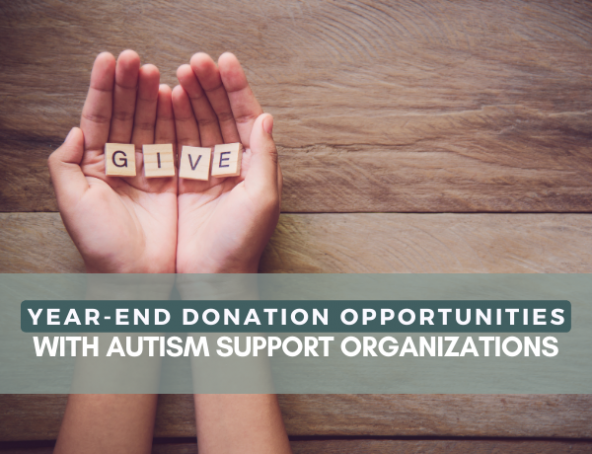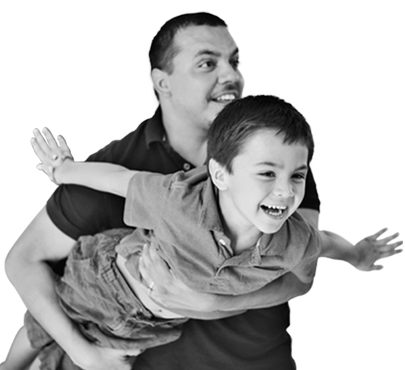Year-End Donation Opportunities With Autism Support Organizations

End the Year On a High Note by Supporting the Future of Good Causes
When we think of holiday giving, we usually think first of family, friends, colleagues, and service providers like mail carriers and hairdressers. However, it’s also meaningful to think of others beyond our personal circles, which is why many people make end-of-year donations to charitable and nonprofit organizations. Whatever may have transpired during a given year—whether it’s a golden year, a typical year, or one like 2020—it’s always healthy to finish it by helping to make the next one brighter for those served by good causes.
Making holiday donations is not only generous, but gives back to the person making the donation as well, since some charitable donations come with tax breaks. If you’re interested in taking advantage of this, visit the IRS website to determine whether the charity of your choice is eligible for tax-deductible donations.
Why You Should Donate to Autism Support Organizations
Important Services Provided by Autism Support Organizations
Although there are many kinds of autism support groups that provide various levels of service, among the most valuable are those that operate on a holistic level. For example, an autism family support group is able to provide services not only to autistic children, but also to their families and caregivers, whose engagement with therapy programs is so integral to childrens’ development.
Essential services offered by family-centered autism organizations may include the following:
- Diagnostic evaluations. Diagnostic evaluations are provided by clinical psychologists who specialize in autism and other developmental disorders. They diagnose autistic children and assist families in understanding how best to serve the child’s needs.
- Family Support. Family support is available to any parent, family member, or individual impacted by autism. This service helps families understand and navigate the roles and logistics of various autism support care systems.
- Applied behavioral analysis (ABA) therapy. ABA therapy is considered one of the most effective treatments for autistic individuals. Administered by expert clinicians, this approach tailors therapy to the specific needs of the individual patient.
- Speech and language therapy. Speech and language therapy is administered by a speech-language pathologist (SLP) and helps children build oral skills. Such therapy offers progress evaluations as well as at-home practice activities, and parents are encouraged to get involved with sessions as much as possible.
- Individual and family counseling. Individual and family counseling provides a way to cope with the challenges of raising an autistic child. In order to effectively support the autistic individual, parents and siblings need to practice healthy and helpful behaviors that keep them from feeling isolated or overwhelmed.
- Sibshops. Sibshops is a nationally-recognized program for children aged seven to fourteen whose siblings have special needs. Activities are designed to help brothers and sisters of special needs children share their experiences and concerns as well as have fun together.
- Clinical family coaching or behavior coaching. Clinical family coaching, also called behavior coaching, trains family members to use behavior change methods to help correct problematic behaviors that an autistic child may exhibit. Coaching sessions take place at home or in other familiar, comfortable settings.
- Habilitation. Habilitation is an in-home service that works with children to develop communication, motor, and behavioral skills as part of a general life skills education program.
- In-home and community-based childcare. In-home and community-based childcare is also offered by some organizations. It’s designed to assist parents and caregivers who are unable to supervise their children for portions of the day or week.
- Social groups. Social groups are facilitated by a speech and language specialist and provide autistic children with playmates and peers with whom they can practice their social skills.
These services take the entire lifestyles of autistic children and their families into consideration rather than focusing only on academic, medical, or therapeutic concerns. When whole families are educated and well-supported, autistic children have a better chance of thriving.
Exceptional Contributions to Society
When you donate to autism organizations, you’re helping to make your community more equitable for people with disabilities—but you may be supporting individuals with some truly extraordinary capabilities as well. A 2018 study showed that one third of autistic adults exhibited superior skills in memory, visuo-spatial ability, mathematics, and drawing or music compared with non-autistic adults.
Today, famous autistic people include climate activist Greta Thunberg, actor Anthony Hopkins, professor and scientist Dr. Temple Grandin, artist Stephen Wiltshire, singer Susan Boyle, New York assemblywoman Yuh-Line Niou, and many other accomplished people with high-profile careers. Making donations to autism-related nonprofits helps autistic individuals reach their full potential and allows the world to benefit from all they have to offer.
Autism Service Organizations Need Your Support This Holiday Season
Treating children with autism and providing family services is expensive, and can cost about $70,000 a year for a single child. In order to reach as many families as possible—particularly those who are systemically underinvested—autism-related nonprofits must rely heavily on grants, fundraisers, and donations. When you support local organizations and services for autism, you’re helping families in your community gain equitable access to essential resources.
If you are from or live in the Southwest, consider donating to autism organizations in Arizona. One of the best autism organizations to donate to in this state is Arizona Autism United, or AZA United. AZA United is a GuideStar Exchange Gold participant, which is a best practice for charitable organizations nationally. The organization was also ranked as a top-rated nonprofit by GreatNonprofits.org in 2019.
Your donations help support AZA United's Family Scholarship Fund, which allows us to offer families a sliding scale for critical programs that have no other funding available. Families in financial need can only participate because of generous donors like you. Donations also help support AZA United's expansion efforts, to open more centers and make more services available to families in need across the state. Thank you for your support, and for helping change the life of an AZA family!
Donations from Arizona residents qualify for the Charitable Organization Tax Credit, which provides a dollar-for-dollar tax credit up to certain amounts. Click here to learn more. Click here for other ways to support AZA United.
You may also be interested in:
Charitable Organization Tax Credit
3 Easy Ways to Support AZA
Donate to Arizona Autism United
For more helpful resources and information, follow AZA United on social media:




